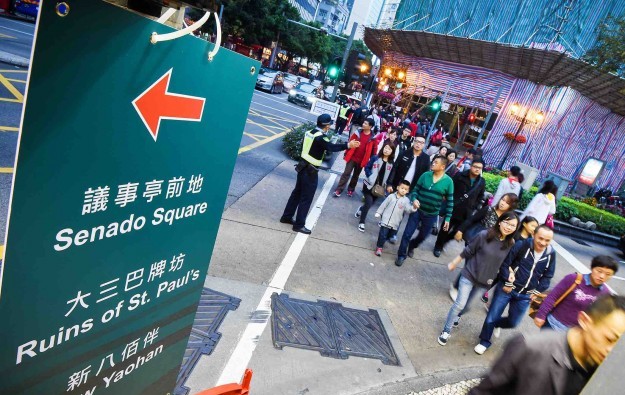Macau govt tilts from advising absolute tourist cap: UBS
Mar 31, 2015 Newsdesk Latest News, Macau, Top of the deck

The Macau government is “tilting” toward better management of tourist arrivals from the mainland during peak holiday periods rather than an absolute cap on numbers, suggests a note from UBS Securities Asia Ltd.
“We believe the tone from the government tilts towards better management of peak holiday periods, rather than a hard cap on total visitations,” stated UBS analysts Anthony Wong and Angus Chan in a note on Monday.
The Macau government is said to be preparing a report for the central government on suggested changes to the administration for Macau of China’s Individual Visit Scheme (IVS) system. The scheme allows independent mainland travellers from designated Chinese cities to come to Macau and Hong Kong.
In February, a senior member of the Macau government talked explicitly of the possibility of a cap on mainland visitor arrivals. But since then the official tone has modified to speak instead of “improvement” to IVS.
A recent report from Macau’s Institute for Tourism Studies said the city’s capacity to absorb visitors “may have reached a saturation point” in 2014.
Macau welcomed a record 31.5 million visitors last year. Mainland visitors accounted for 67 percent of all Macau visitors in the 12-month period. Independent Chinese travellers under IVS accounted for 45 percent of all mainland visitor arrivals.
But UBS suggests that the issue for the casino operators is not so much about how travellers get to the city, but how much they spend when they arrive. Even prior to the gaming revenue slowdown in mid-2014, Macau government data has indicated that overnight IVS tourists spend the most, and same-day package tour visitors the least.
UBS said in its Monday note that despite a 15 percent rise year-on-year in IVS tourists in January and February combined, most of the growth – a total of 13 percentage points – was in same-day visitors.
The UBS research team stated, referring to the January and February numbers for IVS arrivals: “Non-same day [overnight] visitations dropped 4 percent year to date. We think this reflects: 1) weaker high end demand; 2) lack of hotel rooms in Macau; and 3) lower room rates in Zhuhai [which has] become more relevant post implementation of 24-hour [Gongbei] crossing in December 2014.”
The latter was a reference to Macau’s neighbouring mainland city that already acts as a dormitory for some Macau workers. Nonetheless, the number of hotel rooms in Macau is set almost to double over the next few years to around 26,000.
Quality vs quantity
Francis Lui Yiu Tung, vice chairman of Macau casino operator Galaxy Entertainment Group Ltd, on Monday told GGRAsia that Macau was looking to encourage quality customers and not purely a large quantity of them.
Currently most of the volume in mainland visitors is provided via the package route. Analysts have said it is likely to be easier for the authorities to adjust the administration or regulation of the IVS application process than to do so for the entire mainland China travel agent market.
In October 2013 the central government did attempt to curb a trade among mainland travel agents of so-called ‘zero fee’ tours to Macau. Such package products were sometimes accused of luring tourists to the city on free transport and then using pressure sales tactics on shopping tours.
In other commentary on the Macau tourism market this week, Credit Suisse AG analysts Kenneth Fong and Isis Wong said they expected Macau’s gaming revenue trend to show “slight sequential improvement towards May” on the back of China’s Labour Day holiday at the start of the month and the opening of Galaxy Macau Phase 2 on May 27.
Credit Suisse, UBS, Sterne Agee, Daiwa Securities Group Inc and CIMB Securities Ltd all expect Macau’s gross gaming revenue for March to fall by between 39 percent and 40 percent year-on-year, based on unofficial market data up to and including March 29.
The Macau government is likely to announce the official March numbers later this week. CIMB analysts Michael Ting and Jensen Poon said in their Monday note they expected VIP revenue to fall 51 percent year-on-year in March, and the mass segment to decline by 19 percent. The government’s official analysis of the breakdown between VIP and mass is only issued on a quarterly basis.
Related articles
-
 Macau’s May tourism arrivals up 22pct...
Macau’s May tourism arrivals up 22pct...Jun 24, 2024
-
 Cambodia low tax regime a competitive...
Cambodia low tax regime a competitive...Jun 05, 2024
More news
-
 Donaco EBITDA up y-o-y to above US$4mln...
Donaco EBITDA up y-o-y to above US$4mln...Jul 26, 2024
-
 HK listed Palasino upgrades Czech...
HK listed Palasino upgrades Czech...Jul 26, 2024
Latest News
Jul 26, 2024
Border-casino operator Donaco International Ltd has achieved a 164.17-percent year-on-year increase in its latest quarterly group earnings before interest, taxation, depreciation and amortisation...Sign up to our FREE Newsletter
 (Click here for more)
(Click here for more)
Pick of the Day
”We’ve got more traction outside of Macau at the moment. But Macau’s going be a bigger focus for us”
David Punter
Regional representative at Konami Australia
Most Popular
 Sheraton brand to exit Londoner Macao, to be Londoner Grand July 25, 2024
Sheraton brand to exit Londoner Macao, to be Londoner Grand July 25, 2024  Macau regulator probes unlicensed gaming agents July 24, 2024
Macau regulator probes unlicensed gaming agents July 24, 2024  Philippines gives 20k aliens in POGOs 60 days to leave July 25, 2024
Philippines gives 20k aliens in POGOs 60 days to leave July 25, 2024  Philippines-listed DigiPlus says not affected by POGO ban July 24, 2024
Philippines-listed DigiPlus says not affected by POGO ban July 24, 2024  Sands China 2Q EBITDA down q-o-q amid low hold, renovation July 25, 2024
Sands China 2Q EBITDA down q-o-q amid low hold, renovation July 25, 2024






